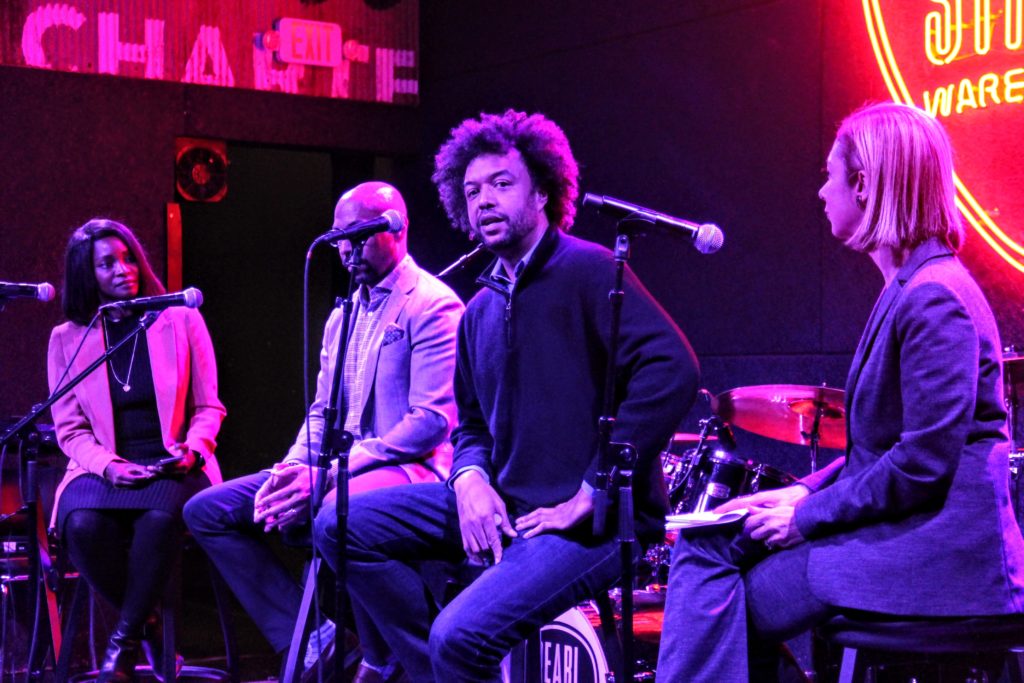By Southwester Staff

Moses, Omrao Brown, and Kathy Hollinger; Courtesy of The Wharf, Washington, DC
In celebration of Black History Month, Pearl Street Stage hosted a unique panel discussion and two musical performances on Feb. 6. The String Queens kicked off the event, warming up the crowd with ethereal sounds of cello, violin, and viola. Before exiting stage right, The Queens played a rendition of Uptown Funk, with one of the members egging the crowd on until we were all standing and clapping.
Afterwards moderator Jummy Olabanji, News4 Anchor, took over the stage alongside Kathy Hollinger, President and CEO, Restaurant Association of Metropolitan Washington; Omrao Brown, a cultural entrepreneur and owner of the famous Bohemian Caverns, and Chair of “Word, beats, and life,” a DC-based hip hop non profit; and, Erik Moses, President of the newly minted DC Defenders XFL team.
“The impact of Black community in DC’s entertainment and hospitality scene reaches far beyond the District Boundaries,” Olabanji told the crowd before introducing the evening’s panelists.
The panel discussion started with Olabanji asking Brown to discuss how the Black community is making waves in the performance space. Brown pointed out the ubiquity and dominance of Black music, not just in American history and culture but also its influence abroad. “You see a number of genres that are successful, if not dominant. Certainly hip hop, R&B, soul… Some of the older genres being jazz and blues… There’s very few American [music styles] that aren’t based in African American music to begin with.”
Getting down to the local level, Brown focused on the music scene in DC and how, for young African Americans, the culture of music is strong and growing. “Specifically here in DC, we got a lot of young musicians that come out of our institutions.” He gave examples of Duke Ellington, the alma mater of Dave Chappelle (not a musician, per se), and Howard University which “has a very strong music program.”
“A lot of those musicians in this area are young and African American and/or black American [and DC] is probably the best city to live in and be a musician without traveling. There’s a ton of work for a lot of musicians that are African American and young.”
Moving to the Black community’s influence in sports culture in the city, Erik Moses said he felt that the representation, both in sports and in the stands, was strong in the community, and that people have to continue to show up and support the teams they love. But he also expressed some concerns about how the city was changing.
“You often hear about the changes in Washington, are they good or bad? I’d say it’s mostly good. What I worry about with our city, as with all others, is does the city get great new buildings, great new spaces, and bring in new residents, like what we’ve been doing for 10 plus years, then lose its soul.”
Picking up on Moses’ last point, Olabanji asked, “Just within the past few years, we’re seeing new restaurants, new venues, new sports venues and sports teams. How do we make sure all of us, and what’re you all working to do, to make sure some of these things are black owned, as well?”
Kathy Hollinger:
As wonderful as all of this development has been all over the city, that’s a big challenge. And, we as an organization have been really focused on, you know, not just talking the narrative around how are we supporting our locally owned businesses, how are we creating more opportunities and pathways so that minorities are owning their businesses and not just working in these businesses.
Omrao Brown:
You all have the ability to vote for what you want the city to be. There’s a Black Restaurant Week that people may or may not know about. I think if we take a little bit of effort to pay attention and at least spend some effort at some point as consumers, we can shape what exists in our own communities. I think we also have some opportunities to do things ourselves that we want to see.
Erick Moses:
What we tend to lack in our community are the reference points of how someone got to where they are. Omrao’s brother is an executive at Monumental and has held some pretty high level positions in professional sports. [T]he more we’re able to connect those dots for young people in particular, to tell them how do you get there. [W]hat are some of the roads you can take. I think that’s probably the first step. We have to have the skills and knowledge of how these organizations run as businesses. Because at the end of day, unless you are a billionaire who can afford to lose millions of dollars a year just for fun, or for a tax break, you have to figure out how to make these sports teams businesses who earn money.
After the discussion, the panelists joined the crowd and Dupont Bass took to the stage to jam out while everyone continued to eat, drink, and enjoy the music.

